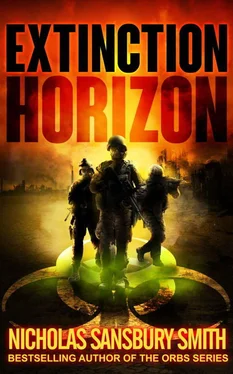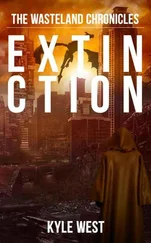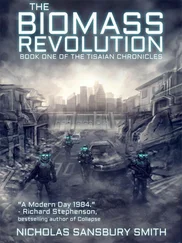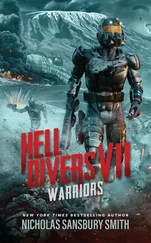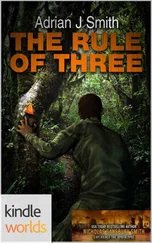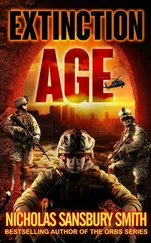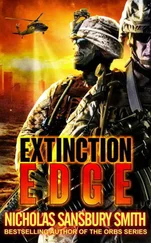Nicholas Smith - Extinction Horizon
Здесь есть возможность читать онлайн «Nicholas Smith - Extinction Horizon» весь текст электронной книги совершенно бесплатно (целиком полную версию без сокращений). В некоторых случаях можно слушать аудио, скачать через торрент в формате fb2 и присутствует краткое содержание. Год выпуска: 2014, Издательство: Createspace Independent Publishing Platform, Жанр: Боевая фантастика, Ужасы и Мистика, sf_postapocalyptic, на английском языке. Описание произведения, (предисловие) а так же отзывы посетителей доступны на портале библиотеки ЛибКат.
- Название:Extinction Horizon
- Автор:
- Издательство:Createspace Independent Publishing Platform
- Жанр:
- Год:2014
- ISBN:нет данных
- Рейтинг книги:3 / 5. Голосов: 1
-
Избранное:Добавить в избранное
- Отзывы:
-
Ваша оценка:
- 60
- 1
- 2
- 3
- 4
- 5
Extinction Horizon: краткое содержание, описание и аннотация
Предлагаем к чтению аннотацию, описание, краткое содержание или предисловие (зависит от того, что написал сам автор книги «Extinction Horizon»). Если вы не нашли необходимую информацию о книге — напишите в комментариях, мы постараемся отыскать её.
_________
Extinction Horizon — читать онлайн бесплатно полную книгу (весь текст) целиком
Ниже представлен текст книги, разбитый по страницам. Система сохранения места последней прочитанной страницы, позволяет с удобством читать онлайн бесплатно книгу «Extinction Horizon», без необходимости каждый раз заново искать на чём Вы остановились. Поставьте закладку, и сможете в любой момент перейти на страницу, на которой закончили чтение.
Интервал:
Закладка:
Before Brett could move, the Marine lunged toward him. They collided, tumbling across the blood-stained dirt. The air in Brett’s lungs burst from his mouth as he finally landed with a thud on the hard earth.
Brett sucked in a deep breath and then pushed himself to his feet. In one rapid thrust, he caught the other man in the side of the face with his knife, lodging the blade inside his skull.
Dropping to the ground, the Marine choked on his own blood and twitched violently. He clawed at Brett one last time before finally going limp.
Gasping for air, Brett stumbled away. He dropped to both knees and squinted as a gust of wind swirled dust around him. Stars broke before his eyes. Dizziness set in. He was finally starting to feel the effect of blood loss, but there was still no pain.
Looking over the field, a distant memory of a brick house and woman entered his thoughts. He quickly pushed them away. There was only one thing that he wanted now. Only one thing he desired…
To kill.

March 3rd, 2015
WHO Field Hospital
Guinea, Africa
Doctor Chad Roberts popped a stimulant into his mouth and swallowed without the aid of any water. He was exhausted from traveling. In less than twenty-four hours, he’d left his office at the Centers for Disease Control headquarters in Atlanta, crossed the Atlantic Ocean, and landed in Conakry, Guinea. From there a chopper had taken him to a World Health Organization field hospital on the outskirts of a remote village twenty miles west of the city of Dabola. The region, while isolated, had a population of approximately 114,000.
During his flights he’d slogged through the reports of the new and deadly Ebola strain. Preliminary notes revealed the microbreak was severe. The virus was killing faster than ever before, and he suspected it had mutated. The mere thought had prevented him from sleeping as he traveled. Chad had arrived with deep bags under his eyes and a headache that made it difficult to think.
Sucking in a long, deep breath, he slipped on his biohazard space suit. The white walls of the portable biohazard facility closed in around him as he pulled on his helmet. The narrow view from his visor always made everything seem smaller, but he also felt safe—secure, even. Many scientists described feeling claustrophobic in the suits, but not Chad. The suit gave him the reassurance he needed to face the world’s most lethal biological agents.
After hastily moving through the laundry list of protocols, Chad pulled back a plastic screen and moved into the next room where Doctor Debra Jones from the WHO waited. She tapped her boot against the floor and glanced up with a scowl when she saw him.
“We’re late,” she said. “The rest of the team is already at the village.”
“Sorry,” Chad replied. “I have a hell of an awful headache.”
“I presume it will get much worse when you arrive in the hot zone,” Debra said coldly.
Chad’s gut sank at the statement. This wasn’t his first time in the field, but he’d never seen the effects of Ebola in person. He swallowed hard as they stepped into the blinding sunlight. The humidity instantly fogged Chad’s visor as they left the cool interior of the biohazard facility. The door sealed behind them with a metallic click.
They moved briskly across a dirt path the color of clay. A Toyota pickup truck waited a hundred yards away, the aged muffler coughing smoke into the sky. Chad set his equipment on the tan bed of the truck and hoisted himself up. He spun and offered a hand to Debra. She took it reluctantly and without uttering a single word. They settled onto the metal bed with their backs against the cab as a slender African man closed the lift gate behind them.
Squinting, Chad looked up at the ruthless midday sun. He’d been outside for only two minutes, but he was already suffocating within his suit. Salty drops of perspiration cascaded down his forehead.
It was going to be a brutally long day.
Typically they would have traveled in the morning to beat the midday heat, but a problem with his equipment back at the airport had caused a delay. Now they were heading out in the hottest period of the day.
The African man smacked the side of the truck, and the driver hit the gas. The Toyota lurched forward and pulled onto a brown frontage road leading away from the cluster of dome-shaped biohazard facilities. Chad stared in awe, realizing how foreign they looked against the lush green landscape. The locals probably thought the white buildings were some sort of alien spaceships.
“How long until we get there?” Chad shouted.
Debra held up three fingers as she watched a herd of gazelle dash across the plains. A cloud of dust followed them over a ridgeline.
The Faranah Region of Guinea was a beautiful place. Thick forests claimed the landscape. The mixture of browns and greens formed a warm collage of colors. But somewhere inside the dense trees, there was an ancient evil.
Chad focused on the plentiful tree line and wondered where the Ebola virus was hiding. They still didn’t know what the reservoir was. Mother Nature had harbored versions of the virus for millions of years, but it wasn’t until the twentieth century that scientists had actually identified the Ebola strain.
Ebola wasn’t the only virus Africa was hiding. The continent was a cesspool for some of the nastiest Level 4 contagions that Mother Nature had cooked up. Chad thought of Africa kind of like a modern day Jurassic Park without the dinosaurs. The world here was prehistoric.
The truck suddenly swerved to the right; dirt exploded from under the back tires and sent a cloud of dust into the sky. Chad flailed his arms and grabbed the side of the pickup. His head bounced up and down as the driver pulled the Toyota to the side of the road. Branches and twigs snapped under the weight of the truck’s oversized tires. When the dust cleared, Chad saw the tree barriers crossing the frontage road they had just come from.
“The locals did that!” Debra yelled. “They’ve done it for decades to stop the spread of infection.”
Chad nodded and tightened his grip on the side of the truck. He’d heard of villages isolating themselves in the past to prevent the spread of deadly viruses. It was probably one reason Ebola rarely showed up in major population centers. People tended to die at home with their loved ones.
Several minutes later, the truck pulled back onto the main road. Glancing through the glass of the cab window, Chad saw they were approaching their location—a small village where the outbreak had started.
Debra had been deployed here a week ago with the first team from WHO. Chad had read her most recent report. The population of the village was ninety-four. Over half of those residents had already been infected, with half of the infected already dead. Preliminary statistics pointed at a new strain, but Chad wasn’t so sure. Not yet.
He bit the inside of his lip as the driver eased the brakes and pulled the truck to a stop about a hundred yards from two WHO doctors wearing biohazard suits.
The local driver jumped onto the dirt and walked around the truck to let Debra and Chad out of the back.
“Thanks,” Chad muttered. He followed Debra to the other doctors, a short man named Howard Lacey and his taller colleague, Bill Fischer. After brief introductions the two men led them toward the village at a brisk and urgent pace.
The buildings were mostly simple mud huts with straw roofs built from the clay-rich dirt. A few of the nicer houses were made of scrap metal with tin roofs.
Читать дальшеИнтервал:
Закладка:
Похожие книги на «Extinction Horizon»
Представляем Вашему вниманию похожие книги на «Extinction Horizon» списком для выбора. Мы отобрали схожую по названию и смыслу литературу в надежде предоставить читателям больше вариантов отыскать новые, интересные, ещё непрочитанные произведения.
Обсуждение, отзывы о книге «Extinction Horizon» и просто собственные мнения читателей. Оставьте ваши комментарии, напишите, что Вы думаете о произведении, его смысле или главных героях. Укажите что конкретно понравилось, а что нет, и почему Вы так считаете.
